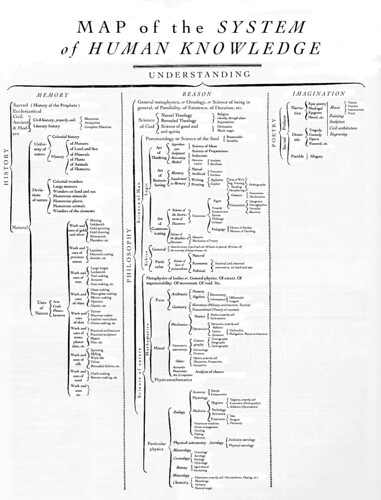It might be okay to “look something up” in an encyclopedia or some other reference volume. But read them? For pleasure? The implication that you spend much time doing so would be close to an insult — a kind of academic lese majesty.
I love them, too. Not surprising, I suppose, given my background as a librarian. Growing up, we always had an old copy of the one-volume Columbia Encyclopedia, now avilable online, and I consulted it regularly. When was the Spanish-American War? What year did Jane Austen die? What's the defenestration of Prague?
The first encylopedias sought to collect all the world's knowledge, categorize it and make it accessible to others. The most famous of these works is Diderot's Encyclopédie, which is available in English translation here. Have a look at Diderot's Map of the System of Human Knowledge (below). Don't you just love the grandeur--or hubris--of the idea?
The Encyclopedia Britannica continued in that tradition. But Britannica really hit its stride in the 19th Century with entries by Sir Walter Scott, Thomas Malthus, David Ricardo and James Mill. In the 20th Century contributors included Sigmund Freud, Albert Einstein, Marie Curie, Leon Trotsky, Harry Houdini, H.L. Mencken, and W.E.B. Du Bois. Later editions lacked the intellectual firepower of those editions and the encyclopedia languished for a while. Here's a snappy history of Britannica.
More encyclopedia trivia: Mussolini wrote the entry on fascism for the Italian Encyclopedia. You can read a translation here.

The encyclopedia is still going strong And while generalist encyclopedias are still around, most of the newer works are more specialized. (Here's a list of some online encylopedias.) We no longer believe we can take all of knowledge and slap it between two covers. Though A.J. Jacobs read the entire Encyclopedia Britannica and wrote a book about it, Know-it-All
Full disclosure: I have written for an encyclopedia, The Encyclopedia of New York City
Update: I've been chastised for not including Wikipedia in this post. I was going to get to it, but somehow didn't. Anyway, the problem with Wikipedia is accuracy (anyone can write anything about anything) and scope. See here and here.
Cross-posted at Blogcritics.
No comments:
Post a Comment